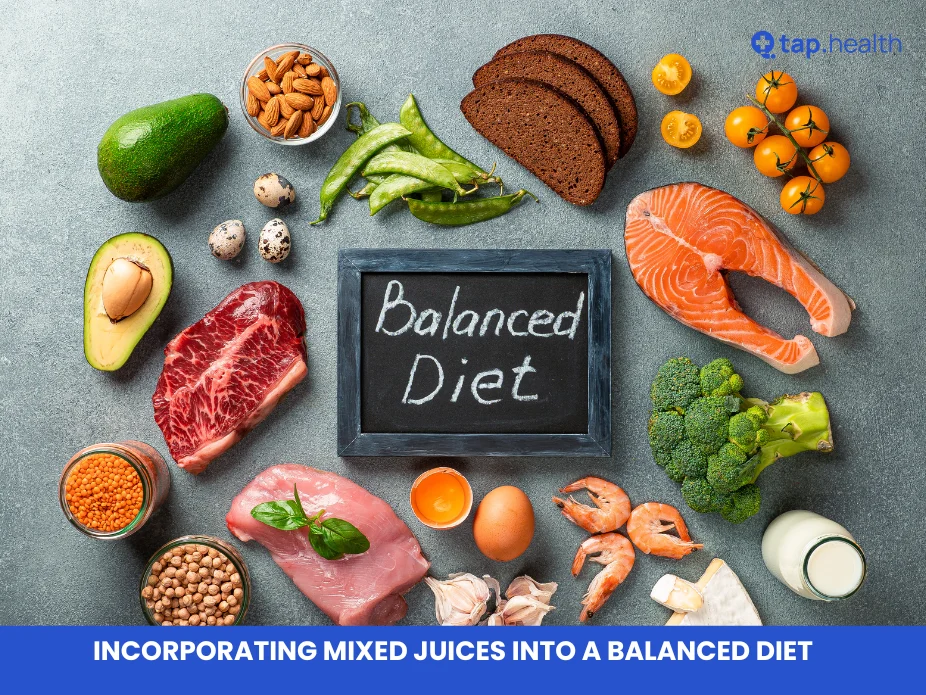In today’s health-conscious world, mixed juices have emerged as a popular way to boost nutrient intake and support overall well-being. When thoughtfully integrated into a balanced diet, mixed juices can provide a convenient and delicious means to enhance your nutritional profile. This comprehensive guide explores how to effectively incorporate mixed juices into your daily meals, supported by real-life scenarios, expert insights, and proven research.
Benefits of Mixed Juices in a Balanced Diet
Enhanced Nutrient Intake
Vitamins and Minerals
Mixed juices are rich sources of essential vitamins such as Vitamin C, Vitamin A, and various B vitamins. They also provide important minerals like potassium, magnesium, and calcium, which are vital for bodily functions including muscle contraction, bone health, and nerve transmission.
Antioxidants
Antioxidant-rich ingredients like berries, leafy greens, and certain fruits help combat oxidative stress, reducing the risk of chronic diseases such as heart disease and cancer.
Hydration
Juices contribute significantly to daily hydration needs. Ingredients with high water content, such as cucumbers and watermelon, help maintain fluid balance and support cellular functions.
Convenience and Accessibility
Mixed juices offer a quick and easy way to consume a variety of fruits and vegetables, especially for those with busy lifestyles. They can be prepared in advance and consumed on-the-go, ensuring you meet your daily nutritional requirements without the hassle of preparing multiple meals.
Weight Management
Low-calorie, nutrient-dense juices can aid in weight management by providing satiety and reducing the temptation to consume high-calorie snacks. Incorporating mixed juices into meals can help create a calorie deficit necessary for weight loss.
Detoxification Support
Certain ingredients in mixed juices, such as lemon, ginger, and leafy greens, support the body’s natural detoxification processes by promoting liver function and aiding in the elimination of toxins.
How to Incorporate Mixed Juices into Your Diet
Meal Replacement
Replacing one meal a day with a nutrient-rich juice can be an effective strategy for those looking to lose weight or detoxify. Ensure the juice contains a balance of carbohydrates, proteins, and healthy fats to maintain energy levels and prevent muscle loss.
Snack Option
Instead of reaching for unhealthy snacks, opt for a mixed juice that includes fiber-rich ingredients like apples or carrots. This can help curb hunger and provide sustained energy without the excess calories.
Breakfast Addition
Start your day with a mixed juice alongside a balanced breakfast. This can provide an immediate boost of vitamins and minerals, enhancing your morning energy and focus.
Post-Workout Recovery
A juice containing electrolytes, such as coconut water, and protein sources, like spinach or chia seeds, can aid in muscle recovery and replenish lost nutrients after exercise.
Hydration Throughout the Day
Sip on mixed juices between meals to stay hydrated and maintain steady energy levels. This can also help improve digestion and metabolism.
Real-Life Scenarios
Balancing a Busy Lifestyle
Sarah’s Morning Routine:
Sarah, a 34-year-old marketing executive, juggles a demanding job and family responsibilities. She incorporates a green mixed juice into her morning routine, blending spinach, cucumber, green apple, and a splash of lemon juice. This quick and nutritious drink ensures she starts her day with essential vitamins and minerals, boosting her energy levels without the need for a heavy breakfast.
Supporting Athletic Performance
Mike’s Fitness Regimen:
Mike, a 28-year-old amateur runner, uses mixed juices to enhance his training regimen. He prepares a post-run juice with beets, carrots, ginger, and coconut water. This combination helps in reducing muscle soreness, improving blood flow, and replenishing electrolytes lost during his runs, supporting his overall athletic performance.
Managing Weight Loss
Emily’s Weight Loss Journey:
Emily, a 45-year-old teacher, aimed to lose weight by incorporating mixed juices into her diet. She replaced her afternoon snack with a fiber-rich juice made from apples, celery, and kale. This not only kept her full longer but also provided her with essential nutrients without adding extra calories, aiding her in losing 20 pounds over six months.
Enhancing Immune Function
Tom’s Cold Prevention:
During the flu season, Tom, a 50-year-old manager, boosts his immune system by drinking a daily juice blend of oranges, carrots, ginger, and turmeric. This mixture, rich in Vitamin C and antioxidants, helps him stay healthier and reduces the frequency of common colds.
Expert Contributions
Nutritionist Insights
Dr. Amanda Green, Registered Nutritionist:
“Incorporating mixed juices into a balanced diet can significantly enhance your nutrient intake. However, it’s essential to ensure that these juices complement your meals rather than replace whole foods entirely. Including a variety of fruits and vegetables in your juices can help you obtain a broad spectrum of nutrients necessary for optimal health.”
Dietitian Recommendations
Michael Lee, Certified Dietitian:
“When creating mixed juice blends, aim for a balance of sweet and savory flavors to make them more palatable. Incorporating ingredients like leafy greens, fruits, and spices can enhance the taste while providing comprehensive nutritional benefits. Additionally, adding sources of protein, such as Greek yogurt or plant-based protein powders, can make your juices more satiating.”
Medical Perspectives
Dr. Laura Martinez, Physician:
“Mixed juices can be beneficial for individuals looking to increase their intake of fruits and vegetables. However, it’s important to monitor the sugar content, especially for those with diabetes or insulin resistance. Opting for low-sugar fruits and balancing them with fiber-rich vegetables can help mitigate these concerns.”
Recommendations Grounded in Proven Research and Facts
Enhancing Nutrient Absorption
Research published in the Journal of Nutrition highlights that certain nutrients, like Vitamin C, enhance the absorption of non-heme iron from plant-based sources. Combining ingredients such as citrus fruits with spinach in your mixed juices can improve iron uptake, benefiting individuals with iron deficiency.
Supporting Digestive Health
A study in the American Journal of Clinical Nutrition found that the fiber in mixed juices can aid in maintaining a healthy gut microbiome. Including fiber-rich fruits like apples and vegetables like carrots can promote regular bowel movements and overall digestive health.
Boosting Metabolism
According to research in Nutrients, ingredients like ginger and green tea extract can boost metabolism and support weight loss efforts. Incorporating these into your mixed juices can enhance their fat-burning potential and improve metabolic rates.
Reducing Inflammation
Studies published in the Journal of Clinical Medicine indicate that anti-inflammatory ingredients like turmeric and blueberries can reduce systemic inflammation, lowering the risk of chronic diseases. Including these in your mixed juices can contribute to overall health and longevity.
Factual and Reliable Information
Understanding Caloric Intake
While mixed juices are nutritious, it’s crucial to be mindful of their caloric content, especially when used as meal replacements. A typical 8-ounce serving can range from 100 to 200 calories depending on the ingredients. Balancing juice intake with overall daily caloric needs is essential to prevent unintended weight gain.
Balancing Macronutrients
To create a balanced diet, ensure your juices contain a mix of carbohydrates, proteins, and healthy fats. For example, adding a tablespoon of chia seeds or a scoop of protein powder can provide healthy fats and proteins, making your juice more filling and nutritionally complete.
Avoiding Excessive Sugar
High sugar intake from fruit-heavy juices can lead to spikes in blood sugar levels. Opt for a higher proportion of vegetables to fruits in your juice blends to keep sugar levels in check. Ingredients like cucumbers, spinach, and celery can provide volume and nutrients without adding excessive sugars.
Incorporating Fiber
Fiber is essential for digestive health and maintaining stable blood sugar levels. While juicing typically removes most of the fiber, incorporating some pulp or using a blender instead of a juicer can help retain dietary fiber in your juices. Fiber-rich ingredients like apples and carrots can also contribute to satiety and digestive health.
Choosing Organic Produce
Organic fruits and vegetables are free from harmful pesticides and chemicals, making them a healthier choice for juicing. Organic produce often contains higher levels of certain nutrients, enhancing the health benefits of your juices. Additionally, supporting organic farming practices contributes to environmental sustainability.
Storage and Freshness
To maximize the nutritional benefits of your juices, consume them immediately after preparation. If storage is necessary, use airtight containers and refrigerate for up to 24 hours. Cold-pressed juicers are recommended as they preserve more vitamins and enzymes compared to traditional centrifugal juicers.
Hydration and Overall Health
Proper hydration is essential for overall health, and mixed juices can contribute significantly to your daily fluid intake. However, it’s important to complement juice consumption with adequate water intake throughout the day to maintain optimal hydration levels and support bodily functions.
Real-Life Scenarios
Family Health Routine
Jessica’s Family Wellness:
Jessica, a 38-year-old mother of two, wanted to improve her family’s health without adding extra meal preparation time. She started making mixed juices every weekend, incorporating a variety of fruits and vegetables. Her family now enjoys a healthy morning juice together, boosting their nutrient intake and fostering healthy eating habits from a young age.
Office Health Boost
Daniel’s Workplace Strategy:
Daniel, a 29-year-old accountant, often felt sluggish during long office hours. He began bringing mixed juices to work, blending ingredients like kale, pineapple, and ginger. This not only kept him energized but also reduced his reliance on sugary beverages, leading to better concentration and productivity throughout the day.
Senior Health Support
Margaret’s Senior Nutrition Plan:
Margaret, a 70-year-old retiree, aimed to maintain her health and mobility. She incorporated mixed juices rich in calcium and Vitamin D, using ingredients like spinach, fortified almond milk, and orange juice. This helped her support bone health and maintain her active lifestyle.
Expert Contributions
Nutritionist Insights
Dr. Amanda Green, Registered Nutritionist:
“Incorporating mixed juices into your diet can be a fantastic way to increase your intake of essential vitamins and minerals. However, it’s important to ensure that these juices are part of a balanced diet that includes whole foods to provide necessary fiber and proteins. Variety is key to obtaining a broad spectrum of nutrients.”
Dietitian Recommendations
Michael Lee, Certified Dietitian:
“When designing mixed juice blends, consider the balance of flavors and nutrients. Combining sweet fruits with leafy greens and adding spices like ginger or turmeric can enhance both the taste and health benefits. Additionally, including sources of protein and healthy fats can make your juices more satisfying and nutritionally complete.”
Medical Perspectives
Dr. Laura Martinez, Physician:
“Mixed juices can support various aspects of health, including immune function, digestion, and weight management. However, individuals should be cautious of the sugar content in fruit-heavy juices, especially those with diabetes or insulin resistance. It’s advisable to consult with a healthcare provider before making significant dietary changes.”
Recommendations Grounded in Proven Research and Facts
Enhancing Nutrient Absorption
Research in the Journal of Nutrition shows that combining Vitamin C-rich fruits like oranges with iron-rich vegetables like spinach can enhance iron absorption, which is crucial for individuals with iron deficiency or anemia.
Supporting Digestive Health
A study published in the American Journal of Clinical Nutrition found that the fiber in mixed juices helps maintain a healthy gut microbiome, promoting efficient digestion and nutrient absorption. Including fiber-rich ingredients like apples and carrots can support these benefits.
Boosting Metabolism
According to research in Nutrients, ingredients such as green tea extract and ginger can increase metabolic rate and support weight loss. Incorporating these into your mixed juices can help enhance your body’s ability to burn calories more efficiently.
Reducing Inflammation
Studies in the Journal of Clinical Medicine have demonstrated that anti-inflammatory ingredients like turmeric and blueberries can reduce systemic inflammation, lowering the risk of chronic diseases and supporting overall health.
Supporting Immune Function
Research published in the Journal of Nutrition highlights the role of antioxidants and vitamins in supporting immune function. Mixed juices containing ingredients like citrus fruits, berries, and leafy greens can strengthen the immune system and help the body fend off illnesses.
Factual and Reliable Information
Sugar Content Considerations
While mixed juices are nutritious, it’s essential to monitor their natural sugar content. High-sugar fruits like mangoes and grapes can increase calorie intake and cause blood sugar spikes. Balancing these with low-sugar vegetables like cucumbers and spinach can create a healthier juice blend.
Portion Control
Managing portion sizes is crucial to prevent excessive calorie and sugar intake. A standard serving size for a mixed juice is typically 8 to 12 ounces. Drinking larger quantities can lead to unintended weight gain and disrupt your balanced diet.
Organic vs. Conventional Produce
Choosing organic produce for your juices minimizes exposure to pesticides and harmful chemicals. Organic fruits and vegetables often contain higher levels of certain nutrients, enhancing the overall health benefits of your juice blends.
Storage and Freshness
To preserve the nutritional integrity of your juices, consume them immediately after preparation. If storage is necessary, keep them in airtight containers in the refrigerator for up to 24 hours. Using cold-pressed juicers can help retain more vitamins and enzymes compared to traditional juicing methods.
Incorporating Pulp for Extra Fiber
Including some pulp in your juices helps retain dietary fiber, which is essential for digestive health and maintaining stable blood sugar levels. Using a blender instead of a juicer can help preserve more fiber in your juice blends, providing additional health benefits without compromising taste.
Hydration and Overall Health
Proper hydration is fundamental to maintaining overall health. Mixed juices contribute significantly to daily fluid intake, supporting metabolic processes and aiding in the transportation of nutrients throughout the body. However, it’s important to complement juice consumption with adequate water intake to ensure optimal hydration.
FAQs
How can I incorporate mixed juices into my daily diet?
You can incorporate mixed juices by replacing one meal a day with a juice, having a juice as a snack, adding a juice alongside your breakfast, or drinking a juice post-workout for recovery.
Are mixed juices better than smoothies?
Both mixed juices and smoothies have their benefits. Juices are typically lower in calories and sugar, making them suitable for those aiming for weight loss. Smoothies retain more fiber and can be more filling, providing sustained energy.
Can mixed juices help with weight loss?
Yes, mixed juices can aid in weight loss by providing nutrient-dense, low-calorie options that help reduce overall calorie intake while maintaining satiety. However, they should be part of a balanced diet and not replace all meals.
What are the best ingredients for balanced mixed juices?
The best ingredients include a combination of leafy greens (spinach, kale), hydrating vegetables (cucumber, celery), low-sugar fruits (green apple, berries), and superfoods (ginger, turmeric). Adding sources of protein and healthy fats can also create a more balanced juice.
Should I use a blender or a juicer for making mixed juices?
Using a blender retains more fiber and nutrients compared to a juicer. Blended juices are thicker and more filling, which can help in managing hunger and supporting overall health. However, if you prefer a smoother texture, a cold-pressed juicer is a better option than traditional juicers.
Can mixed juices replace meals in my diet?
Mixed juices can replace one meal per day as part of a balanced diet. However, it’s important to ensure that the juice is nutrient-dense and balanced with proteins, healthy fats, and carbohydrates to maintain overall health and energy levels.
How long should I follow a juice-based diet?
A juice-based diet can be followed for a short period, such as a few days to a week, to detoxify and reset your system. For long-term health benefits, it’s important to transition to a balanced diet that includes a variety of whole foods while incorporating juices as a supplementary component.
How can I make my mixed juices more satisfying?
To make your juices more satisfying, include ingredients that provide a sense of fullness, such as cucumbers and celery. Adding sources of protein like plant-based protein powder or healthy fats like chia seeds can also enhance satiety and support muscle maintenance.
Conclusion
Incorporating mixed juices into a balanced diet offers a myriad of health benefits, from enhanced nutrient intake and improved hydration to support for weight management and immune function. By thoughtfully selecting a variety of fruits, vegetables, and superfoods, you can create delicious and nutritious juice blends that complement your meals and support your overall health goals. Real-life success stories, expert insights, and research-backed recommendations underscore the effectiveness of mixed juices as part of a holistic approach to wellness. Remember to practice portion control, choose high-quality organic produce, and balance juice intake with whole foods to maximize the benefits and achieve sustainable health improvements. Whether you’re aiming to boost your energy, support your immune system, or enhance your overall nutrition, mixed juices can play a pivotal role in your balanced diet.




